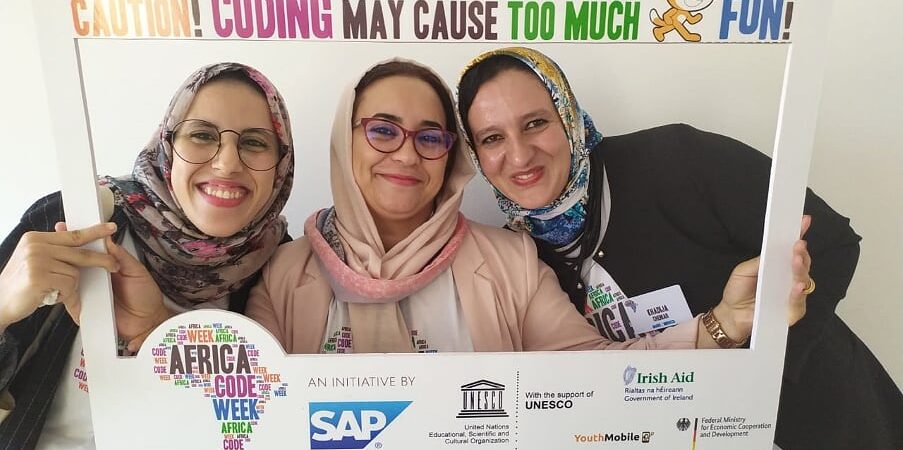Africa Code Week (ACW) returned for its fifth year with an ambitious goal of introducing 1.5 million young Africans to digital and coding skills and a strong focus on girl empowerment.
SAP, UNESCO, Irish Aid, the German Federal Ministry for Economic Cooperation and Development (BMZ) and partners gathered in Rabat to declare the 2019 edition open across 37 countries from the National Training Centre (CFRN) of the Moroccan Ministry of National Education, Vocational Training, Higher Education and Scientific Research.
Mobilising female teachers around World Teachers’ Day
The 2019 ACW kicked off with a workshop aimed at mobilising female teachers to increase girls’ access to digital education. Held at the CFRN in partnership with UNESCO as part of its global World Teachers’ Day activities, the workshop brought together 27 highly influential female teachers with extensive academic and non-academic track record of instilling STEM skills in students aged eight to 16.
The workshop follows in the wake of a series of Train-the-Trainer sessions that were held in participating countries since August and equipped local teachers and volunteer trainers with the teaching tools they need to impart digital skills to students during ACW 2019 in October.
Frederic Alran, SAP Managing Director North & West Africa, said there is great urgency in advancing women’s equal economic participation in the global digital economy.
“At a global level, women hold only 24% of all jobs in the ICT industry, and 250 million fewer women than men are online, denying them access to information, education and active participation in the economy,” he said.
“With the support of our public and private sector partners, volunteers, teachers and ambassadors, we aim to close the digital gender gap and help ensure everyone can play a role in shaping Africa’s future in the Fourth Industrial Revolution.”
The group of 28 female teachers attending the workshop in Rabat came from 15 African countries. Over the course of the four days, they attended immersive training sessions on computational and design thinking. After getting to grips with the technologies sitting at the heart of the Fourth Industrial Revolution, participants also shared best practices on girl mentoring, capacity-building strategies and imparting digital skills to students aged eight to 16.
October 5 was World Teachers’ Day, established by UNESCO in 1994 in commemoration of the adoption of the 1966 ILO/UNESCO Recommendation regarding the Status of Teachers. The recommendation sets the benchmark for the rights and responsibilities of teachers worldwide and establishes standards for teachers’ preparation and training, recruitment, employment, and teaching and learning conditions.
In his keynote address at the launch ceremony, Ruairí de Búrca, Director-General of Irish Aid, confirmed that the Government of Ireland’s official international development aid programme will be supporting Africa Code Week alongside SAP, UNESCO and other partners.
“If we are to achieve the global vision for education which the international community agreed as Goal 4 of the Sustainable Development Goals, we must work together to ensure that everyone has access to digital skills development efforts, so that the advantages of the global digital economy are available to all,” said de Búrca.
“Ireland is proud to celebrate the fifth year of Africa Code Week together with private and public partners and, especially, with a group of African women teachers who in addition to their key role in building digital skills capacity are also such amazing role models.”
Launching fifth edition of ACW from Morocco, a leader in digital skills development
Since the inception of ACW in 2015, Morocco has been leading by example, with a record of 8,600 teachers trained and 1.6 million youth introduced to coding skills as part of the initiative.
For Ilham Laaziz, Director of the GENIE programme at the Moroccan Ministry of National Education, Vocational Training, Higher Education and Scientific Research, the initiative speaks volumes about the power of public-private partnerships in the Fourth Industrial Revolution.
“ACW is an extraordinary lever to make digital learning both a priority and celebration for teachers and students across an entire nation,” said Laaziz.
“This is what happened in Morocco and we commend SAP, UNESCO and their partners for the vision and scope of this initiative. It is a great honour for Morocco to be launching this fifth edition to students, teachers and volunteers across the 37 participating countries.”
Claire Gillissen-Duval, Director of EMEA Corporate Social Responsibility and Africa Code Week Global Lead at SAP, added: “ACW partners are tackling the issue of digital inclusion and gender equality head-on through a range of initiatives that form part of this year’s edition.
“With the support of our continent-wide network of government, private sector, NGO and industry partners, we hope to bring more youth – girls and boys – into the digital fold during this year’s ACW activities.”



